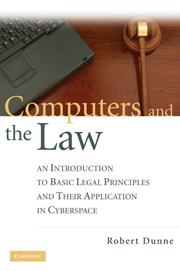Book contents
- Frontmatter
- Contents
- PREFACE
- ACKNOWLEDGMENTS
- 1 THE COMMON LAW AND STATUTORY LAW
- 2 CONTRACTS
- 3 TORTS INTRODUCTION
- 4 DEFAMATION
- 5 THIRD PARTY LIABILITY
- 6 COPYRIGHTS
- 7 TRADE SECRETS
- 8 TRADEMARKS
- 9 THE RIGHT OF PRIVACY
- 10 E-MAIL
- 11 THE RIGHT OF PUBLICITY
- 12 CONSTITUTIONAL LAW
- 13 PORNOGRAPHY AND OBSCENITY
- 14 ADVERTISING AND SPAM
- 15 JURISDICTION
- AFTERWORD
- INDEX
15 - JURISDICTION
Published online by Cambridge University Press: 05 June 2012
- Frontmatter
- Contents
- PREFACE
- ACKNOWLEDGMENTS
- 1 THE COMMON LAW AND STATUTORY LAW
- 2 CONTRACTS
- 3 TORTS INTRODUCTION
- 4 DEFAMATION
- 5 THIRD PARTY LIABILITY
- 6 COPYRIGHTS
- 7 TRADE SECRETS
- 8 TRADEMARKS
- 9 THE RIGHT OF PRIVACY
- 10 E-MAIL
- 11 THE RIGHT OF PUBLICITY
- 12 CONSTITUTIONAL LAW
- 13 PORNOGRAPHY AND OBSCENITY
- 14 ADVERTISING AND SPAM
- 15 JURISDICTION
- AFTERWORD
- INDEX
Summary
Introduction
Before a court can hear a case, two types of jurisdiction are required: subject matter jurisdiction and personal jurisdiction.
Subject Matter Jurisdiction
Subject matter jurisdiction is the power to decide the particular type of dispute. Only state courts have subject matter jurisdiction over civil suits between citizens of the same state. Every state has at least one court of general jurisdiction. (That is, it can hear any kind of claim between any parties – unless specifically prohibited from hearing certain types of cases, for example probate or family law cases, for which special courts are provided.)
Federal courts are all courts of limited jurisdiction (as opposed to general). That is, federal courts can hear cases only as specifically authorized by the statutes creating the court. For federal courts, the outer bounds of jurisdiction are set by the Constitution, Article III, Sec. 2. Congress can limit federal courts to less subject matter jurisdiction, but cannot grant more than allowed in the Constitution.
Federal courts have subject matter jurisdiction in three instances:
when there is jurisdiction based on “diversity” of the parties;
when the case involves a federal question; and
when the court has supplemental jurisdiction (which permits a defendant with a counter-claim to bring it in federal court if the court would have had jurisdiction over the original claim).
Federal courts have subject matter jurisdiction based on diversity of the parties (“Diversity Jurisdiction”) in several instances:
when the suit is between citizens of different states,
when the suit is between a citizen of a state and a subject of a foreign country,
[…]
- Type
- Chapter
- Information
- Computers and the LawAn Introduction to Basic Legal Principles and Their Application in Cyberspace, pp. 383 - 424Publisher: Cambridge University PressPrint publication year: 2009



